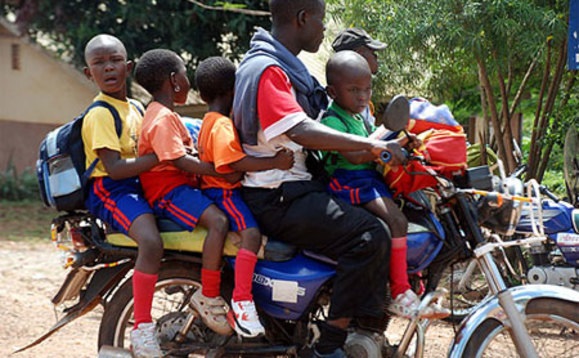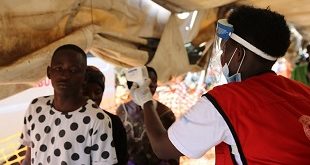 a
a
Kampala, Uganda | THE INDEPENDENT | Road safety experts and activists, including representatives from Hope for Victims of Traffic Accidents (HOVITA), United Nations Association Uganda (UNAU), Zembo Motors, and Africa Youth Leadership Development and Health (AYLDH), have cautioned parents against transporting their children top of motorcycle fuel tanks, stressing that it poses significant risks to their lives.
Rev. Evatt Mugarura, the founder of AYLDH, highlighted the dangers faced by children riding on the fuel tanks of Boda Bodas, stating that they become vulnerable and act as a shield for the rider. Even minor collisions or encounters with obstacles can result in the child being the first to fall off.
Statistics indicate that Uganda loses an average of 631 children in road crashes annually, with nearly 2,000 sustaining life-threatening injuries. Experts believe that these tragic incidents can be reduced by avoiding risky behaviors such as carrying children on fuel tanks and overloading motorcycles.
“Some of the risks for road crashes children are exposed to include sitting them on fuel tanks which limit the flexible movement of cyclists as well as risking them crashing head-on. Overloading whereby one loads over 4 children on one motorbike, in addition to sitting them alone without an elder to support them,” Mugarura said.
The shield campaign, launched in Kampala Tuesday, aims to discourage the practice of loading multiple children on a single motorcycle, which forces riders to place children on fuel tanks.
Sylvester Ndagize, a parent and Boda boda rider at the Makindye Luwaffu stage, highlighted financial difficulties as a reason some parents insist on placing three or more children on a single motorcycle. “I have children who are in school but I make sure I don’t load all of them on my motorcycle. But parents say they don’t have money and ask us to put four children on one motorcycle. Then, you’re forced to carry one in front, which is not good,” Ndagize said.
Police records over the past five years revealed that 3,155 children under 18 died in road crashes, with 5,949 sustaining injuries. Robert Byamukama, an administrator at Boda Industry Uganda, stressed that the campaign targets both riders and passengers.
Mary Namata, an IT graduate and mother of three, acknowledged hiring an experienced motorcyclist to transport her children to a nearby school, emphasizing the importance of ensuring their safety.
“Only two of my three children are in school. But we use one motorcycle to transport them to school alongside one of my neighbors. The rider we use is experienced and we told him to ensure our children are taken or returned safely. We even ask children to tell us about his conduct on the road,” Namata said.
Jackie Okao, the in-country coordinator of the Global Health Advocacy Initiative, highlighted health risks associated with exposing children to cold temperatures and emissions from fuel tanks while seated on motorcycles.
Anthony Kimuli from Traffic Safety Awareness Organisation Uganda Limited (TRASAO) emphasized the initiative to train cyclists on road safety and the legal aspect that restricts children under 12 from riding motorcycles alone without an elder’s support. “As adults, it’s our responsibility to protect innocent children from any practices that jeopardize their safety,” emphasized Kamuli.
***
URN
 The Independent Uganda: You get the Truth we Pay the Price
The Independent Uganda: You get the Truth we Pay the Price


